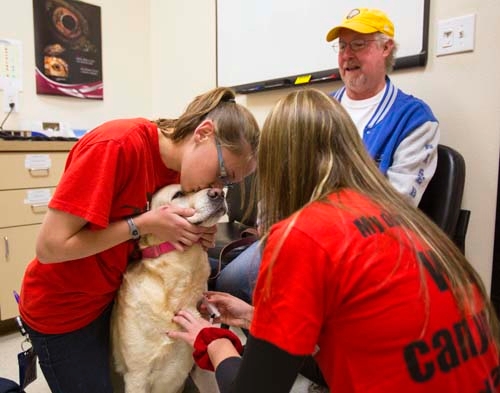Joint blood drive draws owners, pets in Las Vegas
Empty vials and fresh needles lie across the countertops as technicians soothe the incoming blood donors.
Bags of treats sit on the countertop and self-proclaimed, "I'm a blood donor," bandanas are folded neatly beside them.
But as the technicians softly prod for veins, it's not uncomfortable words of pain that patients let out but a softer bark or whimper instead.
Twelve dogs and two cats participated in the first joint blood drive of the Las Vegas Animal Blood Bank and United Blood Services on Saturday. Cats and dogs were brought in to donate blood at the Veterinary Emergency & Critical Care Center, while some of their owners donated their own blood nearby.
Three-year-old Shimmer, a Labrador retriever and patient of the hospital, was one of the first to be screened. As one technician sanitized and searched for Shimmer's jugular vein - where blood is usually taken from animals - another gently held him in place and whispered consolingly as they filled the screening vials.
Within minutes they left the procedure room, Shimmer wagging his tail proudly. A new bandana around his neck read: "Pet me. I'm a blood donor."
PET BLOOD NEEDS OVERLOOKED
Although donating blood is a common practice for humans, it is often overlooked for pets even though there is a dire need, said Bri Durham, coordinator of the Las Vegas Animal Blood Bank.
"A lot of people are scared to have a pet in that situation - to make them donate blood," she said. "But they're OK. Since my dog turned 2, I've had him donate and over time, he's been able to save 72 lives."
While local animal hospitals once relied solely on blood from banks in Michigan, Durham said their need has far surpassed what out-of-state banks can supply.
On average, out-of-state banks can provide only about 14 units of blood per month. And though helpful, that number is minimal compared to the need of local pets - about 60 units per month.
Shimmer's owner, Jessie Broadway, said she thinks it is perfectly sensible to have pets donate blood as well.
"I donate," she said. "This is natural and it's the right thing to do"
While Shimmer has been through two surgeries without the need of a blood transfusion, she said, the possibility is always there, which is why it is so important to have a supply of blood.
Jaimie Haas, a hospital liaison, agreed, noting that while it's never something you want to think about, it's still important.
"We always tell people we hope we don't see you again, because generally when you come to the hospital it's not very good," she said. "This is the same. In an ideal world we wouldn't need this. Prevention medication and vaccines would be enough, but we want to make sure (blood) is available just in case."
BLOOD BANK'S BEGINNINGS
The Las Vegas Veterinary Specialty Center started its own blood bank in 2006 as a way to serve local animals in need more quickly. Employees started by screening their own pets for acceptable blood types, and later expanded into the community.
Prior to the opening of the Las Vegas Animal Blood Bank, animals in need of a blood transfusion would sometimes have to wait two to three weeks in order to receive a shipment, Durham said.
"Unfortunately, there could be fatal consequences if you don't have it right away," she said. "Blood is a product that you need to have. And if you don't have enough blood in your system, we can't do much to save your life."
According to Durham, diseases are the most common reason that pets need a blood transfusion, followed by car accidents. She also noted that the hospital is responsible for treating police dogs if they're injured from duty.
And though the blood bank is now entering its seventh year, members of the blood bank said the need for new donors is increasing because previous ones are being forced to "retire" due to old age and medical conditions.
While the bank once had 52 donors, only 28 are still eligible. Saturday's event focused on screening new pets to see if they met the requirements, among which were a healthy blood history, specific blood types and acceptable ages.
Among the pets tested Saturday, one cat and four dogs were considered eligible to be donors.
HOW PETS CAN QUALIFY
In order to qualify, dogs must be between 1 and 8 years old, be spayed or neutered, and be current on vaccines. The dog also must have never had a litter or history of blood transfusions.
If all qualifications are met, pets will be screened to see if they have a universal blood type. Dogs have 43 different blood types, often making it difficult to match. One blood type, which is found in about one in five dogs, is considered universal and can be given to all dogs.
In contrast, cats have only three blood types - two of which are found in the United States. Both are accepted and stored at the Animal Blood Bank.
Bryon Amador said he brought in his two cats, Koko and Maggie, for screening after a conversation with his girlfriend who works for an animal hospital.
"It makes sense," Amador said. "Just like humans, cats need blood too."
Durham said the bank will continue to host events in order to build a strong supply of local donors.
"It's a concern every single day," she said. "A German shepherd could come in one day immediately needing three units on the spot. What do you do if you just don't have it?"
Contact reporter Tara Verderosa at tverderosa@reviewjournal.com or 702-383-0264.

















